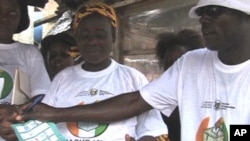Women represent more than 60 percent of the registered voters in Abidjan, Ivory Coast's largest city. They are increasingly a force to be reckoned with in the country's politics. It is a trend that has not been lost on the country's presidential hopefuls, including the two remaining candidates, President Laurent Gbagbo and former prime minister, Alassane Ouattara, who will face off in a second round on November 28.
Just four days before the first round of polling, female supporters of President Gbagbo hit the streets of Abidjan, led by the group's president, Genevieve Bro-Grebe.
"We have been all over the country," said Bro-Grebe. "We have met with everyone to sell our product, our candidate. We are showing women how to vote. In Ivory Coast. Seventy percent of women are illiterate. It is difficult for them to vote, so we are going door-to-door to show them how."
Reading and writing are not the only barriers for female voters. Marie Paule Kodjo runs an Ivorian nonprofit, the Women's Committee for Elections and Reconstruction, which was instrumental in helping women register to vote nationwide.
"Women have been told that it is their father or husband who will tell them who to vote for," said Kodjo. " We have been working so women understand that voting is a personal choice and that they should choose a candidate not based on family, gender or ethnicity but on his or her program. Some women, especially outside Abidjan, do not have the money to vote or to spend time picking up identity and voter cards. It is an obstacle. In certain areas affected by the war, some women are scared to vote. Men have threatened them if they do not vote for a certain candidate."
Since before the first round of polling on October 31, the committee's educators toured Abidjan's markets -- among them one in the low-income neighborhood of Wassaka -- to show women how to cast their ballots. It is a non-partisan effort aimed at making sure their votes are not thrown out for technical reasons.
For example, educators are teaching female street vendors how to properly fold the ballot after marking their candidate so the ink will not smudge into multiple boxes, rendering the vote invalid. But educators say the effort, which is going on nationwide, is also about giving women confidence, a first step to one day getting more women in local and legislative offices that they say are still dominated by men.
Natogoman Coulibaly, the leader of Wassaka's market women, says life has gotten more difficult, especially for the poor, and it is time for women's voices to be heard.
"They showed me how to vote and I am happy. I did not plan to vote, but now I am working with them to encourage other women," said Coulibaly.
The presidential election is meant to end nearly a decade of political crisis after a 2002-2003 civil war.
"The political situation for women is changing, largely because of the crisis Ivory Coast has experienced during which women suffered enormously. They lost their husbands, their children. They have been raped and attacked. Now, women are saying enough. It is time to be brave and get out in front," added Kodjo.
The initial round of polling on October 31 even saw Ivory Coast's first female presidential candidate, Jacqueline Oble, place eighth out of 14 candidates, though she won less than one percent of the vote. No matter who wins the November 28 runoff, political activists say women are set to play a strong political role in the rebuilding of Ivory Coast.












